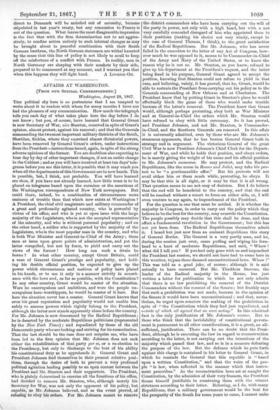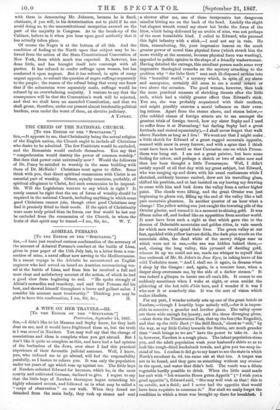AFFAIRS AT WASHINGTON.
FROM OUR SPECIAL CORRESPONDENT.]
Washington, August 29, 1867. THE political sky here is so portentous that I am tempted to write about it to readers with whom for many months I have not had the pleasure of any communication. How much the telegraph tells you each day of what takes place here the day before I do not know ; but you, of course, have learned that General Grant is now Secretary of War, vice Stanton, removed in spite of Grant's opinion, almost protest, against his removal ; and that the Generals commanding the twomost important militarydistricts of the South, Sheridan, Sickles, where they exercised almost dictatorial powers, have been removed by General Grant's orders, under instructions .from the President—instructions issued, again, in spite of the strong adverse opinions of the former. You are doubtless also expecting to hear day by day of other important changes, if not an entire change in the Cabinet ; and as you will have received at least ten days' tele- grams before you see this letter, it is possible that it may reach you when all the departments of this Government are in new hands. This is possible, but, I think, not probable. You will have learned ere then; if you have not already learned, how little trust is to be placed on telegrams based upon the surmises or the assertions of the Washington correspondents of New York newspapers. But could there, indeed, be a combination of circumstances more ominous of trouble than that which now exists at Washington ? A President, the chief civil magistrate and military commander of a great and profoundly agitated country, who is powerful by virtue of his office, and who is yet at open issue with the large majority of the Legislature, who is not the accepted representative of the minority, and who is without personal popularity ; and on the other hand, a soldier who is supported by the majority of the Legislature, who is the most popular man in the country, and who is both War Minister and General-in-Chief of the Army ; these men at issue upon grave points of administration, and yet the latter compelled, but not by force, to yield and carry out the views of the former ! How long can such a strain be borne ? In what other country, except Great Britain, could a man of General Grant's' prestige and popularity, and hold- ing his double official position, be expected to give up the power which circumstance and motives of policy have placed in his hands, or to use it only in a manner strictly in accord- ance with the laws and, as far as possible, with the Constitution? In any other country, Grant would be master of the situation. Were he unscrupulous and ambitious, and were the people un- scrupulous hero-worshippers, he would be master of it here. But here the situation never has a master. General Grant knows that even his great reputation and popularity would not enable him safely to assume powers which rightly belong to the President, although the latter now stands apparently alone before the country. For Mr. Johnson is now denounced by the Radical Republicans ; he is deserted by the moderate Republican politicians (represented by the New York Times); and repudiated by those of the old Democratic party who are looking and striving for its resuscitation. That the last should be the case does not surprise me, who have been led to the firm opinion that Mr. Johnson does not seek either the rehabilitation of that party per'se, or a re-election to the Presidency, but only to discharge to the best of his ability his constitutional duty as he apprehends it. General Grant and President Johnson find themselves in their present relative posi- tions, through the desire of both to prevent a very profound political agitation leading possibly to an open contest between the President and Mr. Stanton and their supporters. The President, who is plainly determined to exercise all the functions of his office, had decided to remove Mr. Stanton, who, although merely his Secretary for War, was not only the opponent of his policy, but capable, as Mr. Johnson believed, and as the event proved, of refusing to obey his orders. For Mr. Johnson meant to remove
the district commanders who have been carrying out the will of the party in power, not only with a high hand, but with a not very carefully concealed disregard of him who appointed them to their positions (making his choice not very wisely, except in the case of General Thomas, I think), to the great satisfaction of the Radical Republicans. But Mr. Johnson, who has never failed in the execution to the letter of any Act of Congress, how- ever much he was opposed to it, means to be Commander-in-Chief of the Army and Navy of the United States, or to know the reason why he is not so. Mr. Stanton, as you know, refused to give up his department at the President's request, and the latter being fixed in his purpose, General Grant agreed to accept the position, knowing that Stanton could not refuse to yield in that case, and believing, vainly, it has proved, that he, Grant, would be able to restrain the President from carrying out his policy as to the Generals commanding at New Orleans and at Charleston. The President knew that by putting Grant in Stanton's place he would effectually block the game of those who would make trouble because of the latter's removal. The President knew that Grant would, although perhaps protesting, obey both as War Minister and as General-in-Chief the orders which Mr. Stanton would have refused to obey with little ceremony. So it has proved, and President Johnson, and not Mr. Stanton, is Commander- in-Chief, and the Southern Generals are removed. In this affair it is universally admitted, eveh by those who are Mr. Johnson's strenuous opponents, that he has beaten General Grant both in strategy and in argument. The victorious General of the great Civil War is now President Johnson's Chief Clerk for the Depart- ment of War, and while he holds that position, and obeys orders, he is merely giving the weight of his name and his official position to Mr. Johnson's measures. He may protest, and the Radical Republicans, like the nurse in Romeo and Juliet, may take his pro- test to be "a gentlemanlike offer." But his protests will not avail either him or them much while, protesting, he obeys. It may be that this is all right, or it may be that it is all wrong. That question seems to me not easy of decision. But I do believe that the end will be beneficial to the country, and that the end will be reached without a resort to force on either side, or, I will even venture to say again, to impeachment of the President.
For the question is one that must be settled. It is whether the majority in Congress, in order to carry out the policy which they believe to be the best for the country, may override the Constitution. The people possibly may decide that this shall be done, and thus effect a fundamental revolution in the Government ; but this has not yet been done. The Radical Republicans themselves admit it. I heard but just now from an eminent Republican this story of General Butler. The General is a very portly man, and he, during the session just over, came puffing and wiping his fore- head to a knot of moderate Republicans, and said, " Whew what did I tell you? If you had only gone with us and impeached the President last session, we should not have had to come here in this weather, topass these damned unconstitutional laws. Whew 1" This was told as a good joke, of course ; although it is said actually to have occurred. But Mr. Thaddeus Stevens, the leader of the Radical majority in the House, has just written a letter for publication in which he not only admits that there is no law prohibiting the removal of the District Commanders without the consent of the Senate ; but frankly says that such a prohibition was not made, because in the opinion of the Senate it would have been unconstitutional ; and that, never- theless, he urged upon senators the making of the prohibition in spite of "the Constitution which they had just repudiated, and outside of which all agreed that we were acting." In this admitted fact is the only justification of Mr. Johnson's course. But to those who think that the inviolability of constitutional govern- ment is paramount to all other considerations, it is a great, an all- suffitient, justification. There can be no doubt that the Presi- dent, although he is executing the law in regard to reconstruction according to the letter, is not carrying out the intentions of the majority which passed that law, and so is in a measure defeating the purpose of the law. But the defence which he puts forth against this charge is contained in his letter to General Grant, in which he reminds the General that this republic is " based upon a written Constitution," and that the voice of the peo- ple " is law, when reflected in the manner which that instru- ment prescribes." As the reconstruction laws set at naught the Constitution, by the admission of their very framers, the President deems himself justifiable in construing them with the utmost strictness according to their letter. Believing, as I do, with many Republicans, that a military government would be the best for the prosperity of the South for some years to come, I cannot unite
with them in denouncing Mr. Johnson, because he is fixed, obstinate, if you will, in his determination not to yield if he can avoid doing so, to the unconstitutional usurpation avowed on the part of the majority in Congress. As to the break-up of the Cabinet, believe in it when you hear upon good authority that it has actually taken place.
Of course the Negro is at the bottom of all this. And the condition of feeling at the North upon that subject may be in- ferred from the action of the State Constitutional Convention of New York, from which much was expected. It, however, has done little, and has brought itself into contempt with all parties. It has refused to confer suffrage upon women, but has conferred it upon negroes. But it has refused, in spite of many urgent appeals, to submit the question of negro suffrage separately to the people ; the reason of the refusal being that every one knew that if the submission were separately made, suffrage would be refused by an overwhelming majority. I venture to say that the consequence will be that the Convention's work will be rejected, and that we shall have no amended Constitution, and that we shall groan, therefore, under our present almost intolerable political burdens, even under the worst of them, an elective judiciary.
A YANKEE.































 Previous page
Previous page